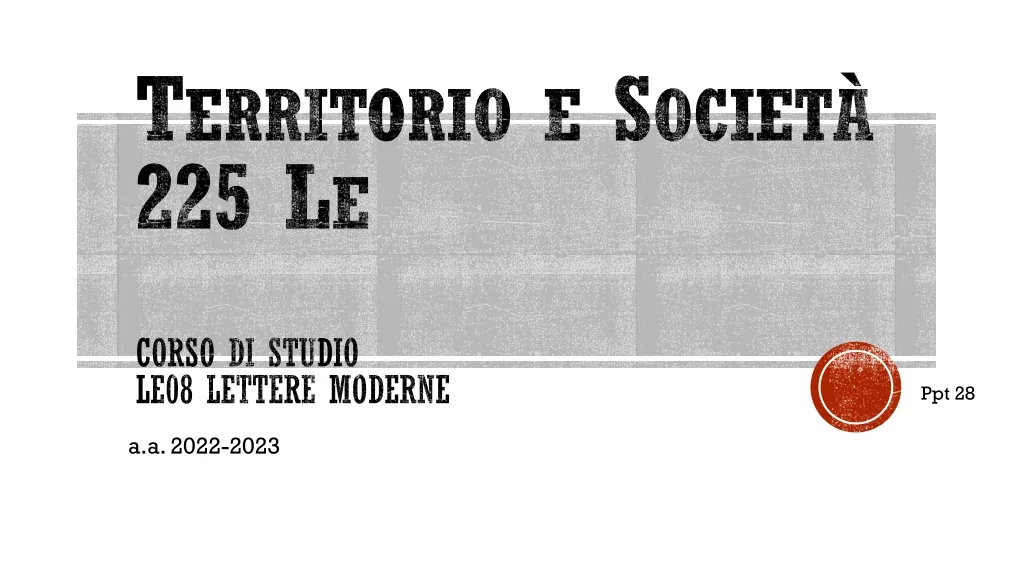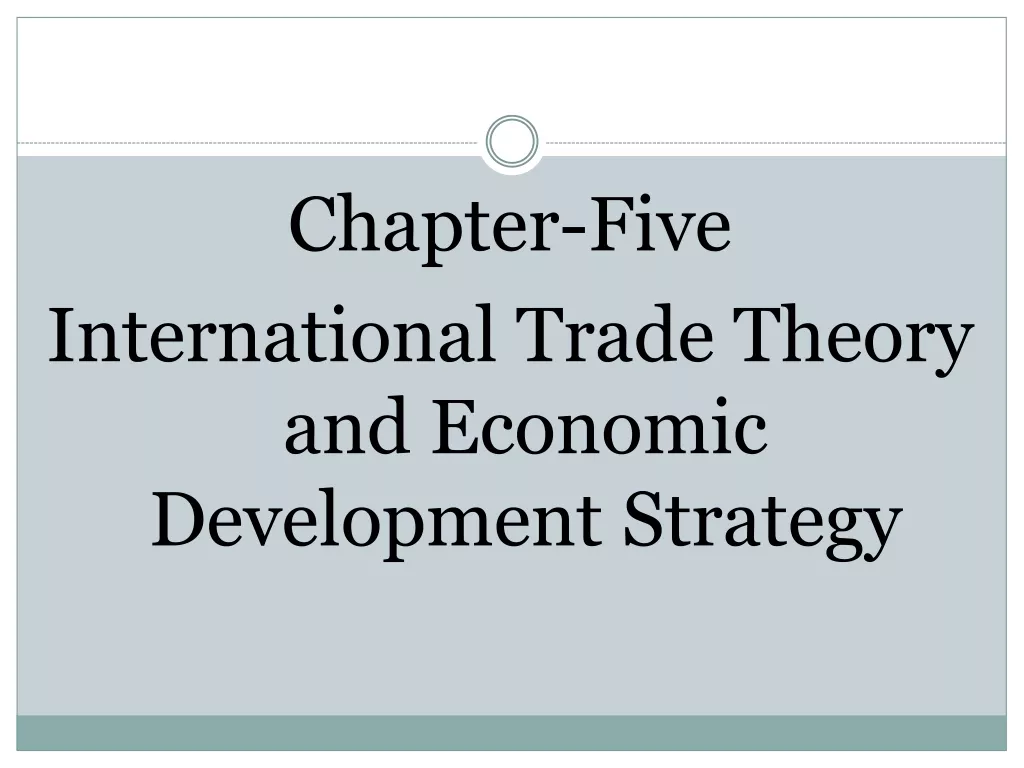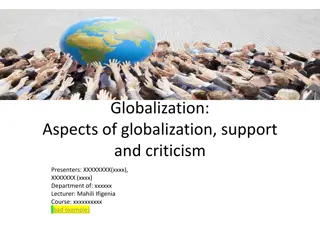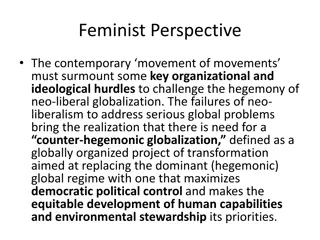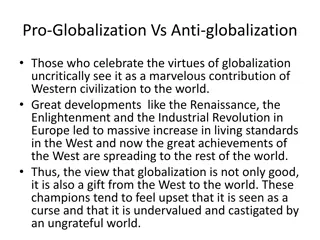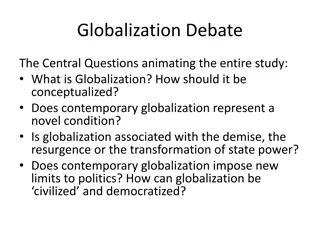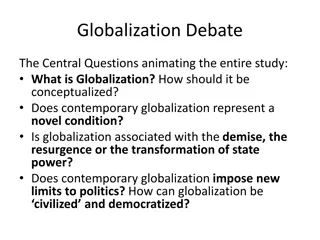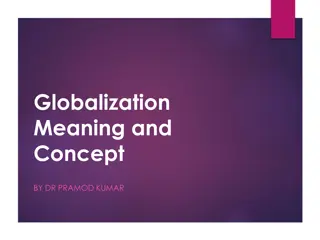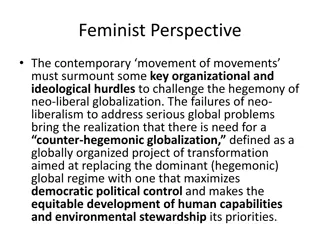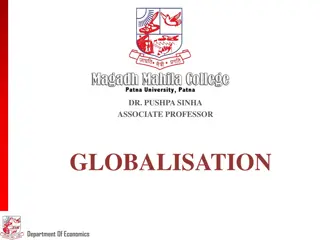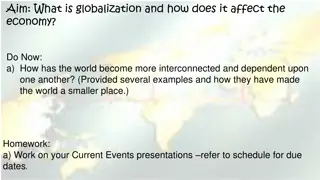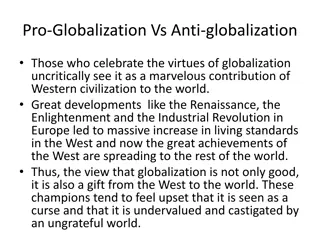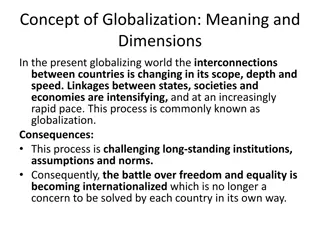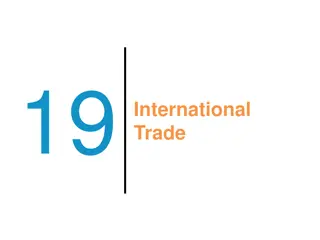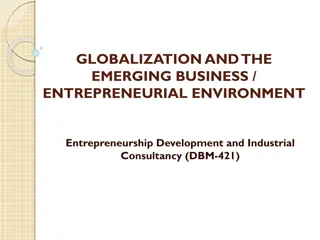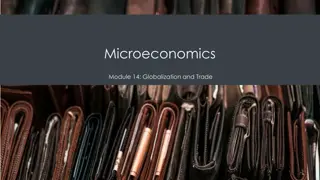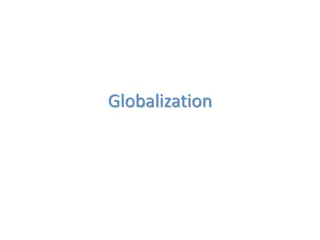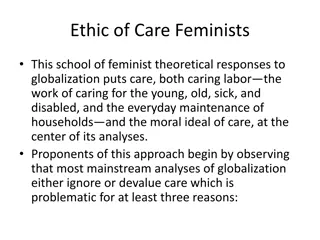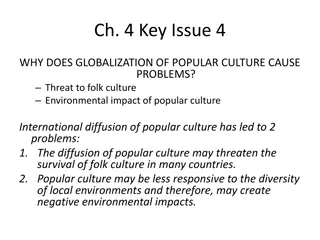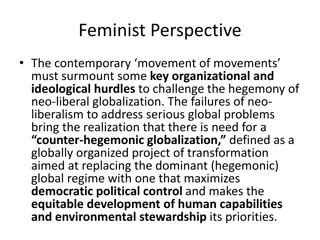The Impact of Technological Innovations on Globalization and Culture
Globalization is a multi-dimensional, contested process shaped by technology and culture. Technology plays a crucial role in shaping cultural identity and facilitating global connections. Historical and contemporary examples demonstrate how technological disruptions have influenced cultural evolution and the spread of ideas. The integration of technology and globalization in the 21st century is redefining culture across different contexts.
Download Presentation

Please find below an Image/Link to download the presentation.
The content on the website is provided AS IS for your information and personal use only. It may not be sold, licensed, or shared on other websites without obtaining consent from the author. Download presentation by click this link. If you encounter any issues during the download, it is possible that the publisher has removed the file from their server.
E N D
Presentation Transcript
Chapter-6 Technological and cultural dimension of globalization
Introduction As globalization is multi dimensional process and highly contested, study of its any dimension cannot be done in isolation. While technology represents material aspects of social life ,the realm of culture involves a system of meaning , values and human imagination about self and surrounding world. The cultural community determines individual identity to a large extent by providing a definite system of meanings Technological means and tools facilitate construction of collective identity and solidarity as printing press and consequent mass education system through printed words and imagery helped construct sense of nationalism.
Understanding culture and technology Culture has been conceptualized as an essence and as a process Culture, in former sense, maintains its certain essential feature and attributes and core values and defines identity of its constituent memnbers As a process culture is seen as continuously changing and informed by numerous internal processes and shaped by external forces. Technological innovations have historically been drivers of socio economic change and helped transmission of cultural values and imagery.
Massive technological disruptions in the area of transport, communication, chemical process and textile which is called industrialization gave birth to capitalism in Europe. Capitalism transformed the norms and value system of European people .print capitalism ,for example, helped standardized script leading to production of same text. Through these text meaning via religion ,philosophy spread through out Europe. a unified and singular science etc
Globalization and technological innovations The second half of 20thcentury developments-beginning of financial globalization in 1970s and beginning of information technology (IT) revolution. Both these developments have become complementary to each other in 21stcentury The IT revolution became possible through micro electronic revolution especially introduction of semiconductor and internet technologies linking together millions of computers and other devices across several jurisdictions. With reduction of tariffs on various categories of IT products by governments after signing agreements(1997) and web based software revolution there has occurred information and knowledge explosion accessible to individuals and groups hitherto unconnected and un networked. is marked with two significant
Technology and reconfiguration of culture The technological revolution coupled with financial globalization has been making profound impact on the culture in 21stcentury. As a result of theses two inter related processes culture is being redefined and reconfigured depending upon context and social location. This process of re imagination and reconfiguration can be analyzed through homogenization, hybridization, domination, clash of civilization etc. These processes are also perspectives on culture following processes:
Homogenisation This perspectives see globalization and increasing means of communication as a factors that are promoting universalization of culture. Transnational corporations(TNCs), in pursuit of maximizing profits, mobilize superior resources to create similar tastes, practices and life style creating a c culture of consumerism. Many see it as MacDonalization of world. USA, being the hegemonic power pushes this individualistic consumer culture as standard culture and modern culture constructed through common logos and brand names. It is argued that west has used its military and economic dominance to impose its values ,beliefs and culture on non western societies. These values purport to apply and valid everywhere : democracy, free market, and human right(alternatively consumerism, commoditization and rationality) Critics argue that culture gives the idea of generation of meaning and orientation toward future, this is undermined by culture of homogenization manifested trough advertising ,circuit of exchange ,pricing etc
Clash of Civilisation In cultural discourse over homogenization and cultural imperialism, Islamic fundamentalists have attempted to provide alternative view points to ethnocentric ideas Drawing from Islamic text and Islamic history ,Islamisc scholars lay emphasis on religious rules and obligation and seeks to create a new kind if world civilization based on freedom of man from every authority except God `s authority Samuel P. Huntington argues that religion is defining characteristic of civilization and different civilizations become caught up in conflict along their fault lines and among their leading states because the value they contain matters so much to their adherents. In his thinking what is universalism to west is imperialism to rest. Most muslim countries resist western universalist, resent imposition and avoid convergence.
hybridization As a perspective hybridization entails a dialectic or mutual reinforcement between global culture and particular culture. In the complex interplay of these two the former is seen as influencing the latter and vice versa in a ay that can be called glocalisation. Individuals and different nationals ,ethnic and racial group located in distant settings reacts actively or passively to the same mass media cultural products or symbols differently. Movement between cultural areas always involve interpretation,t ranslation, adaptation, and indigezation as receiving culture bring its own cultural resources to bear in dialectical fashion upon cultural import Globalization has stimulated nations global cities and cultural organization to not only protect but also project their culture in a global space.
domination Perspective of domination derives from the concept of ethnocentrism to understand the subjugation of one culture by another culture. Ethnocentrism represents a perspective to look at non western societies and their practices from their own perspective. Many scholars including Edward Said provided a humanistic critic of western enlightenment and uncovered its link to colonialism and highlighted narratives of oppression, cultural and ideological biases which disempowered colonized people.
Beyond liberal multiculturalism : Negotiating cultural diversity Massive movement of people from one country to another country on account of globalization has created problem of cultural rights of various groups and communities. Multiculturalism has emerged supportive and protective policies, to facilitate coexistence of people belonging to different cultural traditions. In liberal multiculturalism cultural diversity is endorsed only when it is constructed within a framework of toleration and personal autonomy. Pluralism provides much stronger foundation for politics of cultural differences (views of Issaih Berlin). Amartya Sen holds that human identities are not formed by membership of single social group only but diverse groups and conceptualization in former sense leads not only to miniaturization of humanity but make violence more likely. as institutional arrangements,
Retreat of globalization: resurgence of ethno cultural nationalism In recent years Europe has witnessed far right, nationalist and neo fascist parties making significant electoral gains and even controlling the government. After triumphs of Donald trump over `America first` and Brexit, anti-immigration and closing of borders have resonated in policy debates. The increasing economic inequality and perceived status loss among native white population vis-a-vis immigrants on account of free market globalization seem to have fuelled uncertainty that has been harnessed by ethno nationalist. This shift from outward looking and multiculturalism to inward and ethno cultural nationalism is interpreted as viewing culture in static and essential framework without dynamics of internal and external pulls and pressure on culture.
As an idea cosmopolitanism entails that world constitutes a single world community and that people have obligations towards all other people in world regardless of differences of culture and nationality. Individuals every where would come to see themselves as a global citizen united by common interest in global challenges like ecological problems and poverty.
Conclusion With the phenomenal advancements in information and technologies and consequent instant exchange of mass mediated images, script and symbols, imagination about self and surrounding world has undergone profound transformation. There has emerged contestation as to what extent a particular culture is able to maintain its distinctiveness in the face of US sponsored consumer culture. It is argued that after losing direct military control of third world countries, western value and cultural system individualism is presented as standard culture creating pressure on non western culture. This contestation has been interpreted in diverse ways with some scholars seeing as conflict of culture while others as hybridization local culture and global culture reinforcing each other through adaptation ,interpretation and translation. Despite digital divide technology is creating opportunities for cultural mixing ,political atmosphere in Europe endorsing cultural homogeneities. rooted in consumerism and and elsewhere seem to be



